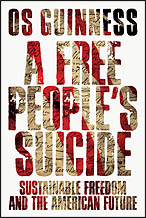 Os Guinness, A Free People’s Suicide: Sustainable Freedom and the American Future. Downers Grove, IL: IVP Books, 2012. $16.00, 224 pages.
Os Guinness, A Free People’s Suicide: Sustainable Freedom and the American Future. Downers Grove, IL: IVP Books, 2012. $16.00, 224 pages.
At the close of the Constitutional Convention in 1787, a woman asked Benjamin Franklin, “Well, Doctor, what have we got—a Republic or a Monarchy?” To which Franklin replied: “A Republic, if you can keep it.”[1] That question and Franklin’s reply cut to the heart of Os Guinness’s new book, A Free People’s Suicide.
According to Guinness, any society that wishes to be free must accomplish three tasks: win its freedom, order is freedom, and sustain its freedom. Americans commemorate the winning of our freedom on July 4, 1776, even though peace with Britain was not formalized until 1783. We commemorate the ordering of our freedom with the adoption (1787) and ratification (1789) of the Constitution. But sustaining our freedom is an unfinished and ongoing task.
Unfortunately, Guinness argues, “freedom has a chronic habit of undermining and destroying itself.” He notes three instances:
- “When freedom runs to excess and breeds permissiveness and license.”
- “When freedom so longs for its own security that its love of security undermines freedom.”
- “When freedom becomes so caught up in its own glory that it justifies anything and everything done in its name, even such things as torture that contradict freedom.”
He then notes that “the last decade has displayed clear examples of each of these corruptions writ large in American culture and in American foreign policy.”
Now, Guinness is a Brit, so it’s easy—too easy—for freedom-loving patriots to dismiss his analysis as so much anti-American twaddle. But Guinness is an America-loving Brit. He doesn’t critique America in order to defame it but to improve it. Indeed, he argues that the sustainability of our freedom depends on our ability to appropriate the wisdom of the Founders for the present day.
A crucial component of that wisdom is what Guinness calls “the Golden Triangle of Freedom”: “Freedom requires virtue, which in turn requires faith of some sort, which in turn requires freedom.” The Constitution cannot secure American freedom in the absence of the character of its citizens. A government for free people requires self-government. But the source of self-government transcends the self and cannot be appropriated by means of coercion. Freedom requires virtue requires faith requires freedom. These qualities are symbiotic and mutually reinforcing.
Like Abraham Lincoln, Guinness doubts that America can be conquered by external foes. In Lincoln’s words, “As a nation of freemen, we must live through all time, or die by suicide.” Rather, the real threat to the American experiment in ordered liberty is internal. In Guinness’s pithy words, “The problem is not wolves at the door but termites in the floor.” Sustainable freedom begins with renewal at the level of our nation’s moral foundation.
If I have any criticism of this otherwise excellent book, it is that Guinness, like the American Founders before him, is vague about the faith that virtue requires. Freedom requires virtue which requires faith of some sort. Those last three words should remind Christian readers—Guinness himself is an evangelical, and IVP Books is an evangelical publishing house—that Americans have always viewed religion in terms of social utility and been hesitant in the face of exclusive truth claims or spiritual practices. Christians in America, then, can contribute to the sustenance of their nation’s freedom, but must beware lest their Kingdom agenda be sacrificed upon a national altar.
P.S. If you found my review helpful, please vote “Yes” on my Amazon.com review page.

